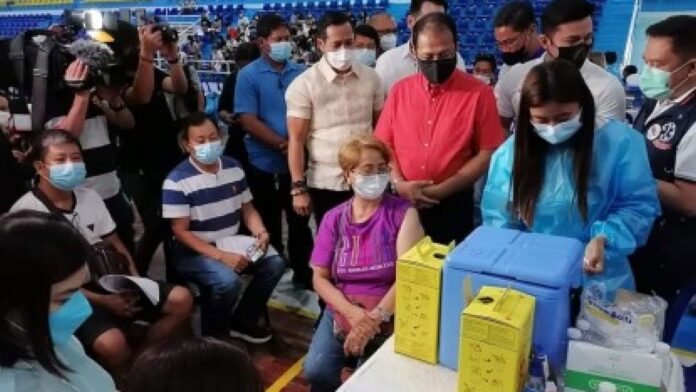Local government units (LGUs) have the authority to impose mandatory inoculation against Covid-19 and eliminate hesitancy and brand preference.
Department of the Interior and Local Government (DILG) Secretary Eduardo Año said local chief executives have autonomous power based on Section 16 of the Local Government Code.
That is, to issue executive orders and ordinances.
“So while we cannot really impose mandatory laws because we don’t have laws, national law, but at least through Section 16 of the Local Government Code, a local chief executive can issue executive order or ordinances that will protect his constituents. That is considered legal unless stopped by the court,” Año told President Rodrigo Duterte during the meeting with the National Task Force Against Covid-19 and medical experts in Malacañang on Monday night.
Año cited League of Municipalities of the Philippines president and Narvacan, Ilocos Sur Mayor Luis “Chavit’’ Singson, who said his unvaccinated constituents are restricted from traveling to other towns.
“We already have LGUs that are announcing, declaring mandatory, and actually, we are encouraging them,” he said.
He then exhorted the public to get their Covid-19 jabs while the vaccines are free “and they can go to any vaccination site and that is for their own good’’.
“Pagka magkasakit po ‘yung tao ng Covid, hindi niyan pinipili mayaman o mahirap, pero two million po ‘yan kapag critical or severe. Iyan po ang billing niya (Covid chooses no one, rich or poor. Critical or severe treatment will cost you about PHP2 million),” Año stressed.
“Let them feel the pressure, the hardship, the difficulty, and then they will be willing to be vaccinated. Many of the hesitancy are actually based on fake news and reading materials that are not true.”
He made it clear though that members of the indigenous communities and indigents can rely on the government to shoulder their medical or burial expenses.
In a separate interview, DILG Undersecretary Jonathan Malaya noted that several LGUs have come up with local ordinances that would restrict the movement of their unvaccinated constituents.
He also suggested that the unvaccinated may still be allowed normal movement provided they present a negative reverse transcription-polymerase chain reaction test result.
Face shield requirement
Año likewise clarified that the use of face shields was not totally disregarded as it remained an integral part of the alert level system.
He said it is voluntary in areas under Alert Levels 1 to 3 while under Level 4, LGUs have the discretion to require face shields.
Its use is mandatory under Level 5.
The return of mandatory use is also being studied depending on developments or when the coronavirus strain Omicron finds its way to the country.
Day 1 peaceful
Meanwhile, Philippine National Police chief, Gen. Dionardo Carlos, declared the start of the three-day national vaccination campaign “Bayanihan, Bakunahan” on Monday “generally peaceful”.
“No untoward incidents recorded in 4,540 vaccination sites around the country. This means our police units and personnel efficiently performed their roles to maintain peace and order in the designated areas,” he said in a statement.
The PNP deployed 15,420 personnel to 4,540 sites nationwide on top of 3,640 Medical Reserve Force personnel and vaccinators and 2,365 encoder and technical support staff.
Nine PNP camps in regional offices were utilized as vaccination centers.
“The work became easier for our medical front-liners because of the show of good behavior, like adhering to health protocols,” Carlos added.
The second leg of the three-day vaccination event will be held from December 15 to 17. (PNA)


